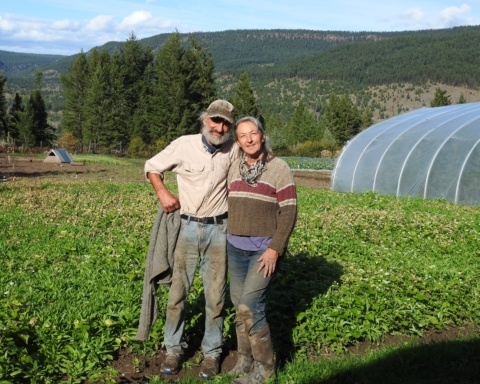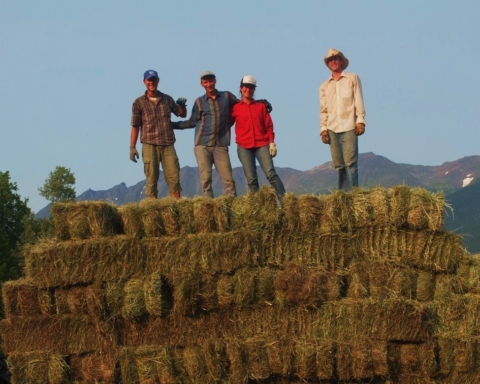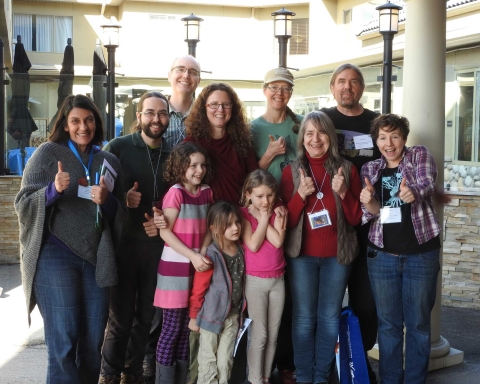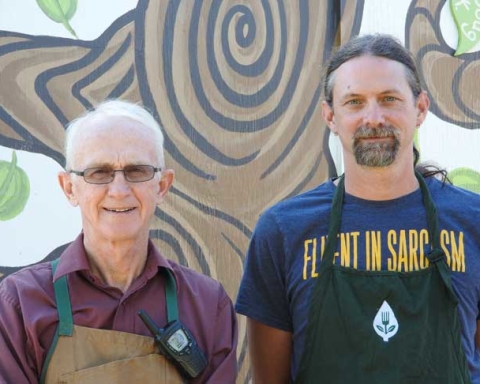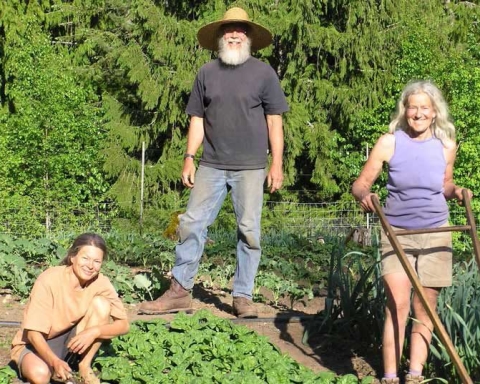Hannah Roessler
As Kristen Jordan of Sea Cider Farm can attest, building a farm business is never simple. Planning, preparation and plain hard work are the main ingredients in her recipe for success.
“Cider is a humble beverage,” says Kristen Jordan, the owner of Sea Cider Farm and Ciderhouse. We’re sitting in the cidery’s grand tasting room, gazing out over acres of orchard apples reaching to the Salish Sea. The rows of glorious apples in deeply blushing reds and warm yellows, bathed in sparkling dew, invite you to frolic barefoot in the grass, sampling sweetness in luscious appleform as you skip along.
It’s a gorgeous setting for this “humble beverage.” And for Kristen Jordan it’s been a long journey.
Finding Her Way to the Garden
In the early 70’s Kristen’s parents bought a waterfront orchard property at Eagle Bay on Shuswap Lake. They spent summers enjoying the land and eating apples, but managing the orchard wasn’t a priority. When Kristen’s father passed away, the orchard was left to her. Away at university in Wales, Kristen would sometimes think of her orchard as she drank cider at a pub, but meanwhile the forest grew over the property.
In the 1990s, married and with children of her own, Kristen moved back to BC with her family to run the orchard, intending to build a legacy she could leave for her children, just as her father had for her.
We had the idea, oh yeah, I’ll just start a cidery with this orchard, how hard can that be?”
“We had the idea, oh yeah, I’ll just start a cidery with this orchard, how hard can that be?” laughs Kristen, “My ex-husband and I thought, okay, he can make the cider and I’ll sell the cider, and that’s all we’ll need.” Not everything went according to plan. The old orchard on Shuswap Lake eventually had to be abandoned as a growing site. “It was this beautiful hidden orchard dream, but it didn’t work out for us,” says Kristen.
In 2003, Kristen and her husband bought the site of the Sea Cider Farm on the Saanich Peninsula. It had been a sheep pasture, and prior to that a loganberry farm producing berries for the first commercial winery in BC. Kristen planted 1000 trees over 4 acres of the 10 acre property, leaving the rest as forest.
Putting the Pieces Together
Though she took chances, Kristen did not jump into the cider-making business blindly. She went to “cider school” at Washington State University, which ran a cider-making course through their extension office in Mt. Vernon. Her teacher was Peter Mitchell, an English cider guru. “He had a big influence on me in my early years of cider making,” Kristen remembers. “His course was very extensive, and it took us through everything from organoleptics, [taste, smell, etc.] to industrial design, to biochemistry.”
Sea Cider opened its doors to the public in 2007 after 3 years of learning and development. Initially, 90% of the business was from walk-in customers. “I remember when someone would drive up to do a tasting, and we’d all be down working in the orchard, so someone would have to run up the hill, wash their hands, and do the tasting,” Kristen laughs.
The initial 1000 trees were mostly English bittersweets and bittersharps. As luck would have it, Kristen found a hobby grower in Langley with 1000 whips of English cider varieties. Because of all she had learned from Peter Mitchell, Kristen was convinced that BC would fall in love with English cider.
“English cider is very tannic and very phenolic, which means it’s got a lot of minerality, a lot of appleyness on the nose. Compared to Growers Cider – it’s night and day,” notes Kristen. “I also wanted to grow varietals that I wouldn’t have access to on the market. No one is selling yarlington mills, dabinetts, or brown snouts, so that’s what I wanted to grow.” Today the orchard has nearly 1500 trees, and over 60 varieties of apples.
Success Through Experimentation
“You make the cider that you like and you just do lots of experiments. We made a lot of funny ciders by accident… for example the Rumrunner cider,” recalls Kristen with a smile.
For Rumrunner, Kristen sourced Winter Bananas and Stayman’s Winesaps from the Similkameen valley, and aged the cider in a rum barrel. She called the Newfoundland Liquor Corporation and asked them to send used screech barrels, where she let the cider sit for 1.5 years. It came out a beautiful colour, with a lot of flavourful depth; Rumrunner is now a staple Sea Cider product.
You make the cider that you like and you just do lots of experiments. We made a lot of funny ciders by accident… for example the Rumrunner cider,” recalls Kristen with a smile.
Another lucky accident happened when a member of the BC Fruit Tasters Association called to say they had found a Perry orchard in North Stanch.
“Perry pears are very tannic, inedible, really astringent,” explains Kristen. “But if you grind and ferment them, those tannins drop out, and you are left with this softly tannic, slightly off-dry pear drink which is called Perry.” Kristen began experimenting with different yeasts, fermenting the brew in oak barrels, and soon produced a beautiful Perry cider.
Even before she planted her first trees, Kristen was experimenting with brewing cider. She kept 30 carboys of cider on the go, using different yeasts with different apples, and she took notes religiously. She learned a lot about different varietals: which were good growers, which were good fermenters, which worked well with particular yeasts. She envisioned the final product she wanted to create, the taste and mouth-feel of the cider, and worked towards this idea. Kristen admits it hasn’t all been easy: “We made a lot of mistakes. It came down to these big three: how to grow apples, how to make cider, and how to sell cider – that last one is huge.”
Navigating the regulatory world of cider sales involved a daunting learning curve, but Sea Cider is now selling in Alberta, Manitoba, Saskatchewan and the Yukon, as well as Washington, Oregon, Chicago, Northern California and New York.
“In the beginning, liquor stores would be excited about our product, but also a little confused.
“They would say things like: ‘there’s Mike’s Hard Lemonade and Growers, do we put you between the two of these? And you’re in a champagne bottle, not a big plastic bottle?’ It was like trying to introduce a whole new concept into the cider category.”
The Cider World Today
In the last few years much has changed in the cider industry. Today, the market for cider is exploding, and big companies are getting into cider production. While craft-beers have long been holding court for foodies and connoisseurs, cider is squeezing its way into the picture, and being accepted with open arms as more people become aware of the differences wild yeasts and bittersharps can make in ciders. Cider is taking the world by storm.
But there are some downsides to this popularity. Cideries are now forced to compete for the best apples for cider making. This makes Kristen especially grateful that Sea Cider, a BC pioneer in cider-making, grows old English varieties that always make a good cider.
Sea Cider is also pioneering community-building initiatives. The farm partners with the Lifecycles Project Society, a non-profit that promotes food security and urban agriculture, working on the Victoria Fruit Tree Project – an initiative to harvest apples that would otherwise go to waste in urban back yards to brew a cider created from a blend of local King apples and Sea Cider’s English Spies. The farm has also launched a “Canadian Invasion” series of ciders: proceeds from sales of the cider support efforts to combat invasive species in sensitive ecological areas.
We built this space as a place for community and a place for gathering. It was meant as a place where you could raise a glass of cider together. And you know cider is a humble drink.
Although much has changed for Sea Cider over the years, they’ve remained true to their original vision. As Kristen says, “We built this space as a place for community and a place for gathering. It was meant as a place where you could raise a glass of cider together. And you know cider is a humble drink. You don’t ask people to pay attention to it if they don’t want to, they just want to sip on it and enjoy the company that they are in.”
“We don’t need to go into the phenolic character and the minerality, you know, we just enjoy the drink. The fun thing about cider is that it is a very approachable drink, you don’t have to be a wine snob, you don’t have to know anything to enjoy cider.” Kristen pauses, then adds “ …I wanted to create a space where the experience was not just about the specifics of the cider, but an experience that you are sharing with friends and family, where you are enjoying a beautiful setting at the same time.”
Hannah Roessler has farmed in Nicaragua, Washington, and BC on permaculture farms, polyculture cafetals, organic market farms and a biodynamic vineyard. She has an MA in Environmental Studies and her research is focused on climate change and small-scale organic farming. She currently farms on the Saanich Peninsula on Vancouver Island.



